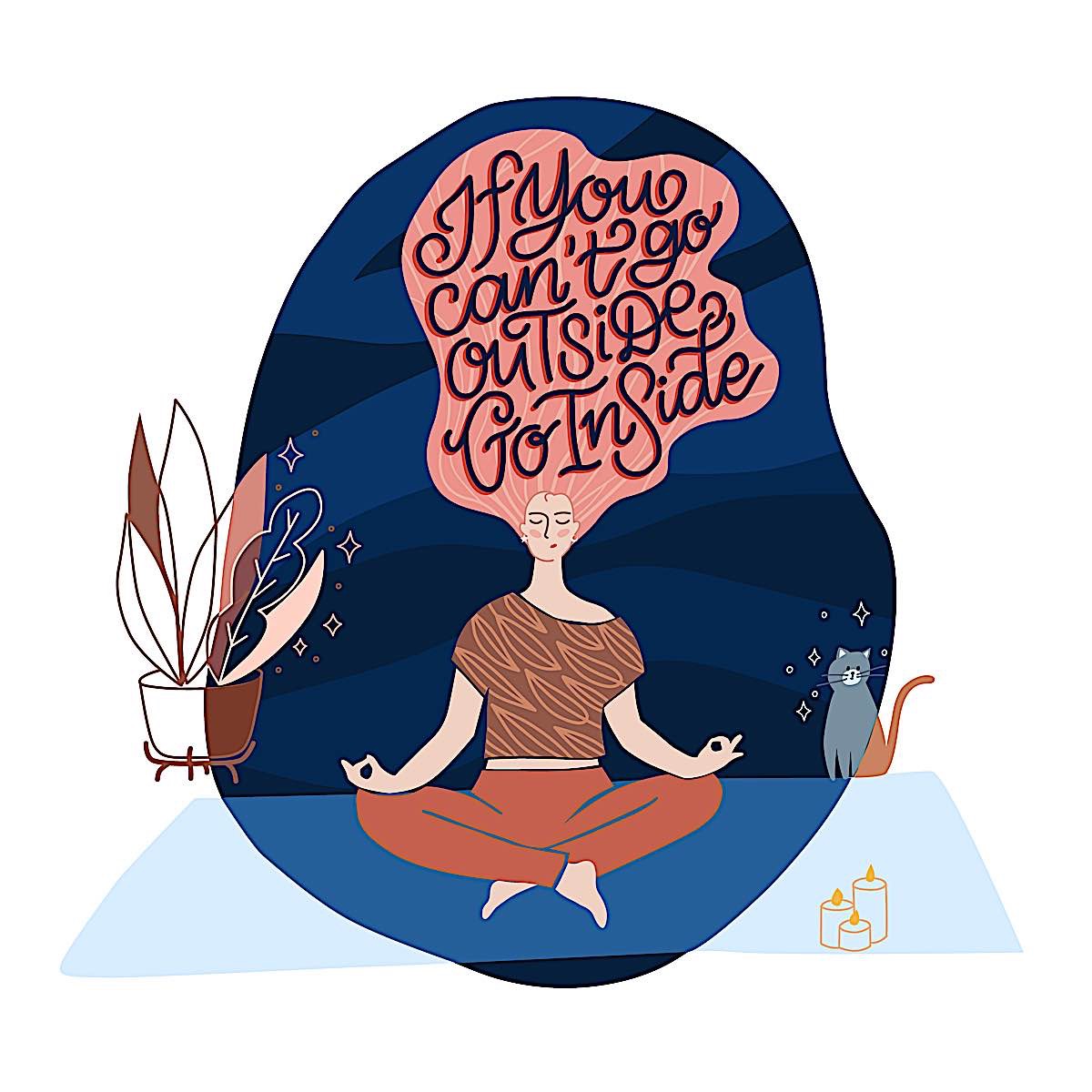If you can’t go outside — go inside. How mindfulness can help cope with COVID-19. 12 easy tips.
Now is the time to get in touch — with your inner self. If you can’t go outside — go inside!
Our lives are more stressful more than ever. The most recent Coronavirus pandemic, a world-wide tragedy, with more than 4.3 million worldwide cases reported, has health and wellness impacts far beyond the virus itself.
By Claudia Jeffrey
[Biography below.]
Amid the COVID-19 chaos, everybody is stressed — and the extended lockdown might lead to stress-related burnouts.
Stress can lead to depression — and we definitely need some good coping skills to stay calm during a crisis. Mindfulness meditation is one method of de-stressing, well-proven in various studies to lower our anxiety, improve our mood, strengthen our health, and help us sleep well. [For links to peer-reviewed research on mindfulness benefits, see our previous feature>>] As discussed in Awakening to Success – following in the Buddha’s footsteps, a key mindfulness method is to live in the present moment.
“The past is gone. The future isn’t here yet,” said the Buddha. Mindfulness — being in the present moment — is the secret of managing our body, feelings, desires, and emotional attachment with people and objects.

How Mindfulness Makes A Difference In Challenging Situations
1. Helps Regaining Emotional Balance
Traumatic situations often knock off our balance, but mindfulness is a crucial element for emotional restoration. It helps us to recover from adverse conditions that are emotionally exhausting and draining. Additionally, researches proved that people who practice mindfulness have greater resilience to stress which is essential for healthy well-being.
2. Strengthens Concentration
Mindfulness exercises are considered to be highly effective for self-management of concentration issues as well. If you are someone who always faces difficulties paying attention to people talking to you, then we have good news for you. Mindfulness helps you improve your ability to focus on details and overlook distractions in your surroundings.

3. Improves Mental Health
Regular practicing of mindfulness breathing trains our brain to focus and speed up mental performance. It helps us enhance our memory while slowing down the ageing process, which causes several age-related mental conditions like dementia and Alzheimer’s. The practice of mindfulness improves the connectivity of our brain when a person remembers about a past event or thinks about the future. Greater connectivity makes the mind strong. Evidence suggests that a daily session of mindfulness is essential to look after your brain health.
4. Helps Control Stress
Mindfulness exercises can help release anxiety and alleviate stress by increasing brain activity. When the cognitive and emotional information is processed rapidly, and the part of the brain that controls worry activates, our stress level reduces.
5. Uncover Blind Spots
By maintaining high awareness of our feelings, thoughts, and judgments, you can expand understanding of your inner world. The purpose is to pay attention to the things around you and experience the sensation with all your senses. You just need to slow down the process and notice things genuinely. This way, you will know your true self in terms of behavior and thinking pattern. This will increase your self-awareness, your satisfaction with the inner self, and will improve your ability to make informed decisions.
6. Decreases Body Pain
A lot of people suffer from physical pain caused by injuries and diseases and buy drugs for achieving the analgesic effect. Mindfulness soothes body pain needing to consume opioids. However, you cannot learn to manage your pain overnight. With regular practice, you can build tolerance towards pain, and this is especially helpful for those who have been using opioids in the past and are at higher risk.
7. Helps Sleep Peacefully
After a tiring day, everyone deserves deep sleep. However, we often can’t sleep under challenging times, especially after hearing a piece of bad news. If you take some time daily from your busy routine and do some mindfulness exercises, you can fall asleep fast. It will reduce fatigue, levels of burnout, and insomnia which significantly improves sleep quality.
12 Ways You Can Practice Mindfulness In Tough Times & Stay Calm
1. Get Comfortable With Uncertainty
It’s natural to hope for better things, but sometimes people get everything and still not happy with their present. It’s in human nature to quest for more, but we can tolerate our cravings by controlling our thoughts and emotions and. The idea behind this is that we often have to accept things that we cannot change or things that are beyond control, but we can recognize them and ease our pain. For example, the COVID-10 outbreak is frightening as well as the uncertainty it causes. Amid the ambiguity and fear, you have to remind yourself to remain neutral and non-judgmental.
2. Use Mindfulness Apps
During stormy phases, you don’t need to schedule a yoga session to practice mindfulness. Installing mindfulness apps in smartphones is quite a trend these days and believed to be an effective method to give your mind and body a much-needed break. There numerous free best meditation and mindfulness apps for 2020 that can help you stay focused during tough times. A five minute of attentive mindful breathing exercise can recharge your brain and help you regain your focus for the more important task at hand. These apps have several guided workouts that you can practice at any noisy place. Some apps come with subscription fee and have more intense programs such as mindfulness for controlling stress eating and healthy sleep.
3. Listen Empathetically
Active listening is a fundamental aspect of communication which is often ignored but can be improved through practicing mindfulness. The recent Coronavirus outbreak has taught humans a lesson the need to fight the virus with empathy. With cases exploding daily people are forced to stay at home and work remotely. At this challenging moment, people need to show compassion and kindness to those who are affected. Don’t listen to respond, but listen to understand and show empathy. Mindful listening allows you to follow a situation from someone else’s perspective by removing the internal and external distractions.
4. Say No To Multitasking
The overwhelming emotions and feelings are very likely in tough times. In these troubling situations, people feel like doing a couple of things at once. For example, a lot of students may want to engage in multi-tasking when they are assigned with multiple assignments and projects for different courses. Studies suggest that multitasking limit human productivity levels and interferes with parts of the brain that help us stay focused. To practice mindfulness at work, studies, and in daily life, you must avoid multitasking and focus on one thing only. Instead, you can make a to-do list and prioritize your tasks.
5. Observe Your Emotions & Thoughts
Like we observe others, we can observe our own thoughts and emotions. To feel more present, you can see how your varied emotions come and go like a passing cloud. When you observe more, the chances increase that you will not be caught up in your feelings. Resist the temptation that pushes yours, though into the tunnel of memories.
6. Turn On Some Music
One of the most simple mindfulness exercises that you can try today is put on your headphones and listening to some music. Music has the potential to shift human moods and feelings, and that’s why it’s widely used as a therapeutic technique. Pick a song that you have never heard before and try to be neutral as much as you can. If you don’t judge the music from its album name or genre, you allow yourself to explore every bit of the melody and power up your day.
7. Do Some Meditation
Undoubtedly, mediation is genuinely a powerful way to nurture mindfulness. There are countless ways to practice meditation. It is a mental training that helps us to stop the racing thoughts that cause an inability in humans to concentrate at present. There are tons of meditation techniques, but in general, it involves breathing, muscle squeezing, mental imagery, and body relaxation. You can also use writing as a meditation practice as penning down your thoughts and feelings helps you to understand yourself better and let of the negativity that holds us back from achieving our true happiness.
8. Practice Self-Compassion
A critical point not to be missed is showing compassion to yourself in hard times. Don’t avoid your feelings instead of accepting them. Make a video of yourself during your tough time when you are filled with heavy emotions. Record yourself and explain the whole situation, including your feelings and thoughts. Play this video after a few days, and you feel compassionate towards yourself. You will have greater self-acceptance as you can see how badly you were caught up in a situation and now you feel healthy again. It will give you hope, and you will begin to trust that hard times don’t last forever.
9. Mindful Media Consumption
While everyone is talking about social distancing these days, one of the most prominent strategies to stop the spread of fear and anxiety is media distancing. The idea is not to boycott media, but to be intentional about what information you are ingesting. Your stress comes from your active imagination leading to destructive thoughts. Our media channels are showing Coronavirus updates round-the-clock and sometimes even false news just to increase their ratings. The constant exposure to negative news is the driver of painful thoughts. Try to explore the bright side of humanity and news about people who survive difficult times and share their stories in your network.
10. Take A Mindful Walk
A fifteen to thirty-minute walk is good for your health, but what do we mean by mindful walk? We take every step automatically without thinking. However, we should occasionally draw our complete attention to walking to experience the uniqueness. When you step out, make sure you pay attention to your body movement and things around you on the street. Use all five senses and observe the sights around you. Note as your feet touch with and leave the ground and capture the events around you.
11. Eating Mindfully
Cooking something healthy is always a better idea than ordering unhealthy junk food online. However, eating is something that we do automatically, like walking. This is often because we are habitual of eating while checking notifications, scrolling Facebook, talking with someone, or watching our favorite series on Netflix. When you eat while distracted by the surrounded, you missed on out on the fact that you eat, and sometimes you eat more than your requirement. To gain the experience of eating, touch the food, smell it, and feel it inside your mouth. When you get the authentic experience of eating, you will feel more satisfied. Remember that when you eat, only eat and when you drink, only drink.
12. Family-Based Mindfulness
Difficult times often affect entire families. Losing a loved on financial difficulties cause distress and cost the whole family. To expand the positive effect of mindfulness, you can practice it as a family and make it as part of your routine. It will make mindfulness more fun and effective. Set aside fifteen to twenty minutes each day for this activity and pick a mindfulness corner in your living room where everyone sits comfortably and exercise together. To model mindfulness, elders need to spend time in self-care. Parents often put pointless pressure on themselves to be a perfect role model for their children. Take out some time for yourself and show your younger ones how you manage your stress and strong emotions.
The Bottom Line
It’s common to fall into overthinking and stressing over things you can’t control. By managing yourself, you can deal with hard times. Among all the tips we’ve shared, some might work for you and some may not. Everyone is different, and so is their preference. The easy way is to get lost in the things you like as they connect us with who we really are.
1 thought on “If you can’t go outside — go inside. How mindfulness can help cope with COVID-19. 12 easy tips.”
Leave a Comment
More articles by this author
Search
Latest Features
Please support the "Spread the Dharma" mission as one of our heroic Dharma Supporting Members, or with a one-time donation.
Please Help Support the “Spread the Dharma” Mission!

Be a part of the noble mission as a supporting member or a patron, or a volunteer contributor of content.
The power of Dharma to help sentient beings, in part, lies in ensuring access to Buddha’s precious Dharma — the mission of Buddha Weekly. We can’t do it without you!
A non-profit association since 2007, Buddha Weekly published many feature articles, videos, and, podcasts. Please consider supporting the mission to preserve and “Spread the Dharma." Your support as either a patron or a supporting member helps defray the high costs of producing quality Dharma content. Thank you! Learn more here, or become one of our super karma heroes on Patreon.
Claudia Jeffrey
Author | Buddha Weekly
Claudia Jeffrey is a Research Analyst at Crowd Writer and Trainer at Assignment Assistance, a reliable platform trusted by millions of students for cheap essay writing service UK. She has been blogging and sharing her knowledge for several years. She likes to connect with like-minded people and inspire them with her opinions.














„If you can’t go outside — go inside.“
Great advice!